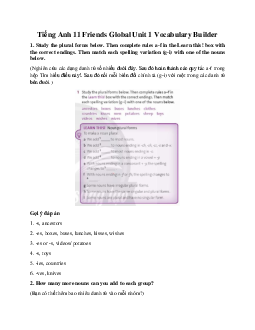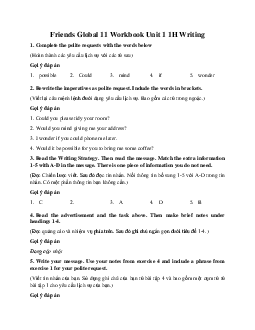




Preview text:
Tiếng Anh 11 Friends Global Unit 1 1F Reading
1. SPEAKING Do you sometimes argue with your parents? What do you argue
about, and why? Use the ideas below to help you.
(Bạn có đôi khi tranh cãi với cha mẹ của bạn? Bạn tranh luận về điều gì, và tại sao? Sử
dụng những ý tưởng dưới đây để giúp bạn.) Gợi ý đáp án
I hardly argue with my parents about anything because my mother always understands
and shares everything with me. But in the past, I remember that I used to argue with my
father about my bedtime. I am a night owl; I can only concentrate on my studying at night
so I don't want to go to bed early. By contrast, my father wanted me to go to bed before
10:00 PM. As a result, I had to share the reason why I wanted to stay up late and luckily,
he understood and let me do everything I wanted.
2. Read the text quickly, ignoring the gaps. Choose the best summary of the text: a, b or c.
(Đọc văn bản một cách nhanh chóng, bỏ qua những khoảng trống. Chọn tóm tắt tốt nhất
của văn bản: a, b hoặc c.) Gợi ý đáp án
C. Teenagers experience big physical and emotional changes during adolescence. It's
important to communicate with your parents and try to understand their point of view
3. Read the Reading Strategy. Then read the sentences below and the highlighted
words in the text. Say which sentence links to which highlighted word and underline
the part of the sentence which helped you to decide.
(Đọc Chiến lược đọc. Sau đó đọc các câu dưới đây và các từ được đánh dấu trong văn
bản. Nói câu nào liên kết với từ được tô đậm và gạch dưới phần của câu đã giúp bạn quyết định.) Gợi ý đáp án A. opinions and B. communication C. secondly D. communication idealistic E. physically F. made decision G. made decision
4. Use your answers to exercise 3 to match sentences A-G with gaps 1-5 in the text.
There are two extra sentences.
(Sử dụng câu trả lời của bạn cho bài tập 3 để nối các câu từ A-G với các khoảng trống từ
1-5 trong văn bản. Có hai câu bị thừa.) Gợi ý đáp án 1. E 2. F 3. A 4. C 5. D
5. VOCABULARY Complete the stems to make a noun and an adjective. Use a
dictionary to help you. Either the noun or the adjective is in the text. (Sometimes
you do not need to add anything.)
(Hoàn thành các từ để tạo thành một danh từ và một tính từ. Sử dụng từ điển để giúp bạn.
Danh từ hoặc tính từ có trong văn bản. (Đôi khi bạn không cần thêm bất cứ thứ gì.)) Gợi ý đáp án
1. adolescence (n), adolescemt (adj)
2. dependent (adj), dependence (n) 3. privacy (n), private (adj)
4. emotion (n), emotional (adj) 5. critic (n), critcal (adj) 6. distrusful (adj)
6. SPEAKING KEY PHRASES Work in pairs or small groups. Discuss points 1 and
2, using the phrases below to help you. Share your ideas and opinions with the class.
(CÁC CỤM TỪ CHÍNH Làm việc theo cặp hoặc nhóm nhỏ. Thảo luận điểm 1 và 2, sử
dụng các cụm từ dưới đây để giúp bạn. Chia sẻ ý kiến và quan điểm của bạn với cả lớp.) Gợi ý đáp án
1. There are five social and emotional changes that the writer describes in the text
(freedom, privacy, interests, decisions, and opinions). Firstly, adolescents always want to
see and make friends with those they want because they think they are mature enough to
do that. Secondly, about privacy, They tend to spend less time with their family than
before since they think they have many more important things to solve than focus on their
home. Next, making decisions is a sensitive problem that parents find hard to deal with.
They like doing things on their way without thinking carefully. Finally, the opinions
between adults and adolescents are also different. In my experience, Because of the
generation gap, our parents understand what we are thinking. Personally, I think that
opinions affect teenagers most because it is the stage they change from teen to adult, their
point of view will change, too. For example, if adolescents aren’t well-educated, they
may try smoking and drinking alcohol because they think it will help them prove they are
cool and mature. It will bring a lot of negative effects.
(Có năm thay đổi về mặt xã hội và cảm xúc mà người viết mô tả trong văn bản (tự do,
riêng tư, sở thích, quyết định và ý kiến). Thứ nhất, thanh thiếu niên luôn muốn gặp và kết
bạn với những người họ muốn vì họ nghĩ rằng họ đã đủ trưởng thành để làm điều đó. Thứ
hai, về vấn đề riêng tư, họ có xu hướng dành ít thời gian cho gia đình hơn trước vì họ cho
rằng mình còn nhiều việc quan trọng cần giải quyết hơn là tập trung cho tổ ấm của mình.
Kế đến, việc đưa ra quyết định là một vấn đề nhạy cảm mà cha mẹ cảm thấy khó giải
quyết với con cái. Họ thích làm theo cách của họ mà không suy nghĩ cẩn thận. Cuối cùng,
ý kiến giữa người lớn và trẻ vị thành niên cũng khác nhau. Theo kinh nghiệm của tôi, vì
khoảng cách thế hệ, cha mẹ chúng ta hiểu những gì chúng ta đang nghĩ. Cá nhân mình
nghĩ quan điểm ảnh hưởng nhiều nhất đến lứa tuổi thanh thiếu niên vì đây là giai đoạn
các em chuyển từ tuổi teen sang người lớn, quan điểm của các em cũng sẽ thay đổi theo.
Ví dụ, nếu thanh thiếu niên không được giáo dục tốt, họ có thể cố gắng hút thuốc và uống
rượu vì họ nghĩ rằng điều đó sẽ giúp họ chứng tỏ mình là người điềm tĩnh và trưởng
thành. Nó sẽ mang lại rất nhiều tác động tiêu cực.)
2. In my opinion, the advice offered by the writer is useful and realistic. I think the best
piece of advice is about communication. I totally agree that communication is the key to
make teenagers and their parents understand each other. No matter how old you are,
family is always your home, and you should share every happiness and sorrow. For
instance, even when you go to work from the early morning until midnight, you ought to
spend at least 30 minutes every day talking with your mom or your dad about your work,
your feelings. That is not responsibility, that is to make your parents trustful and sympathetic.




